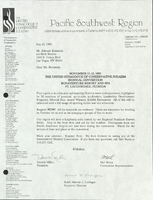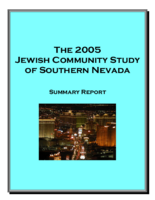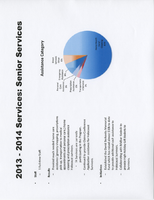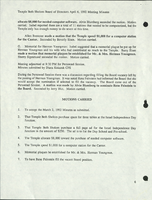Search the Special Collections and Archives Portal
Search Results

Transcript from interview with Mike Unger by Barbara Tabach, January 21, 2016
Date
Archival Collection
Description
In this interview, Unger reflects upon his long and successful career in hotel management in Las Vegas and also in Arizona and Pennsylvania. He shares stories as a local celebrity, particularly in the 1970s and 1980s when he worked at Caesars Palace, as well as the big projects he oversaw, including organizing the first big fight nights, World Series of Tavern Poker and Grand Prix race. He talks about working with Morris Shenker, Moe Dalitz, Cliff Perlman and Billy Weinberger, and the role of the Jewish community in the city, and specifically in the gaming industry. Unger also discusses his non-gaming industry ventures which have included a satellite communications business and a bagel business.
Mike Unger was born in Queens, New York in 1947, and spent most of his childhood in Long Island, growing up in a predominantly Jewish and Italian community. As a young adult, Unger was already working hard, running one of his family?s restaurant after school. When he was in high school, his family moved to Los Angeles to accommodate his father?s health needs, and eventually end up in Las Vegas by 1967. Over the next two decades, Unger would work at nine properties in the city. Unger is one of the University of Nevada, Las Vegas? first hotel management graduates, and started his career with Summa Corporation in its management training program at the Frontier Hotel and Casino. After a brief stint at the Airport Marina Hotel in Los Angeles in 1972, Unger returned to Las Vegas, serving in management capacities at the Aladdin Hotel and Casino, Summa Corporation headquarters and Landmark Hotel and Casino. In 1978, he joined Caesars Palace Hotel and Casino management team, and was integral in creating the city?s first large boxing events, the World Series of Tavern Pool, and the Grand Prix race. Unger also ran properties for the White Mountain Apache and Colorado River Indian Tribes in Arizona, as well as the Showboat Hotel and Casino. In this interview, Unger reflects upon his long and successful career in hotel management in Las Vegas and also in Arizona and Pennsylvania. He shares stories as a local celebrity, particularly in the 1970s and 1980s when he worked at Caesars Palace, as well as the big projects he oversaw, including organizing the first big fight nights, World Series of Tavern Poker and Grand Prix race. He talks about working with Morris Shenker, Moe Dalitz, Cliff Perlman and Billy Weinberger, and the role of the Jewish community in the city, and specifically in the gaming industry. Unger also discusses his non-gaming industry ventures which have included a satellite communications business and a bagel business.
Text

Transcript of interview with Gilbert D. Yarchever by Claytee White, 2006
Date
Archival Collection
Description
Gilbert Yarchever was one of nine siblings, born and bred in Pittsburgh, Pennsylvania. He describes the way his mother?s family was granted the last name of ?Kurfeersf" by Emperor Franz Joseph (of Austria-Hungary), explains the Seder (the Jewish observation of the exodus of Hebrews from Egypt), and tells what it was like to survive the Depression. Gilbert describes the jobs he held after high school and the government examination he took that led to his lifetime of adventure and travel. He moved to Washington, D.C., in 1940 and kept himself busy working for the government and taking classes at George Washington University, as well as working part time at Hecht Department Store and as a freelance court reporter. Following the attack on Pearl Harbor in 1941, Gilbert was sent to Africa on a merchant ship, helped smuggle Jewish survivors into Jerusalem, and was assigned the task of negotiating with Arab sheikhs for laborers to build a road. In the years after that, he worked in Europe, Panama, Alaska, Japan, and Hawaii and describes many of the jobs he was responsible for and many of the individuals he met. He also married and had children, kept up with university classes whenever he could, and collected art objects and paintings. Following his retirement in 1977, Gilbert and his family came to Las Vegas and bought a condo in Regency Towers. He did some consulting work for a couple of years, and then he and his wife began traveling around the states and going abroad. He was involved with UNLV?s EXCEL program, the music department, and the Las Vegas Art Museum. (He and his second wife Edythe presented the first major exhibition on Holocaust art at the museum.) These days Gilbert often donates pieces from his art collection to churches, synagogues, and charitable organizations.
Gilbert Yarchever was in the Navy during World War II, helped smuggle Jewish refugees into Jerusalem, worked as a civil servant in many countries, and moved to Las Vegas in 1977. He helped found the EXCEL program at University of Nevada, Las Vegas and was an art collector with his wife, Edythe Katz-Yarchever.
Text

Minutes from Temple Beth Sholom Board of Directors meetings, July 1993 - December 1993
Date
Archival Collection
Description
Meeting minutes include reports from committees of the board, correspondence, and balance sheets.
Text

Jewish Community of Southern Nevada Summary Report of 2005, published 2007
Date
Archival Collection
Description
This study was conducted in 2005 to better understand the Jewish community in Southern Nevada. The themes of the study include population growth, population geographic shift and dispersal, Jewish youth, Jewish identity, increasing synagogue membership and general participation in Jewish causes.
Text

Overview of Jewish Family Service Agency operations, 2013-2014
Date
Archival Collection
Description
This document contains graphs and charts to document the services provided to the community by the Jewish Family Service Agency in 2013 and 2014.
Text

Transcript of interview with Norma Friedman by Barbara Tabach, November 19, 2015 and April 06, 2016
Date
Archival Collection
Description
It was a scorching Fourth of July, when Norma (n?e Adler) and Leon Friedman rolled into their new home of Las Vegas in 1973. Nevertheless, they were content with leaving Gary, Indiana behind, and starting fresh with the family?s new ownership of Walker Furniture. Norma recalls her first stop in checking out Las Vegas was to visit the synagogue ? Temple Beth Sholom being the only option. Her oldest son would soon become a bar mitzvah. Feeling good about that, she and her sister-in-law who was also relocating to Las Vegas for the furniture business, searched for new homes. Norma settled into the community through volunteer work as well as through employment outside the family business. She worked in the real estate briefly and in a jewelry store at the Dunes. A natural organizer, she immersed herself in religious and civic organizations including the Jewish Federation, Jewish Family Service Agency, and volunteering at Selma Bartlett Elementary School in Henderson. Norma shares stories of her Jewish heritage and upbringing in Pittsburgh, the decision to move to Las Vegas, making fast friendships during her life in Las Vegas and the joy she has in traveling the world with Leon, who passed in 2004. In 2017, Norma was honored by the Jewish Family Service Agency.
Text

Transcript of interview with Priscilla Schwartz by Barbara Tabach, June 16, 2016
Date
Archival Collection
Description
In this interview, Schwartz talks at length about her passion for compassionate hospice care, and her broad involvement with the Nathan Adelson Hospice, from volunteering to serving on the board to philanthropy, which included opening the Walter Schwartz Center for Compassionate Care. Schwartz also talks about other philanthropic giving which includes establishing scholarships at George Washington University and University of Michigan as well as support to Temple Beth Sholom gift shop.
Text

Transcript of interview with Mindy Unger-Wadkins by Barbara Tabach, October 28, 2015
Date
Archival Collection
Description
In this interview, Unger-Wadkins discusses growing up in Las Vegas? close-knit Jewish community in the 1960s and 1970s, and involvement with various Jewish youth organizations and activities. She also describes her career in public relations, reflecting upon the unique challenges faced when interacting with the public, and with politics, in her positions. Unger-Wadkins ends by describing her current work in land development, particularly the history of the Three Kids Mine and the technical and political process of ensuring the land is suitable as a residential area.
Text

Minutes from Temple Beth Sholom Board of Directors meetings, April 1992 - August 1992
Date
Archival Collection
Description
Meeting minutes include reports from committees of the board, correspondence, and balance sheets.
Text

Transcript of interview with Walter Weiss by Claytee White, November 2, 2010
Date
Archival Collection
Description
In this interview, Walter Weiss discusses how Judaism and boxing kept him out of trouble in his youth. Weiss grew up in the Boston area, and started boxing as a teenager. Weiss talks about his boxing training, becoming a runner for a bookmaker, and coming to Las Vegas in the 1950s to be a bookmaker for the Stardust Hotel, and working the slot machine floor. He had several different jobs in various casinos, and discusses different people involved in the gaming industry in Las Vegas.
Walter Weiss life story begins in a Malden, Massachusetts during the Great Depression. His early background was a blend of observant Judaism, secularism, and the effects of the era. He was a troubled youth whose older brother encouraged him to join him in boxing. As Walter explains: I was a wild kid and ... boxing saved my life. His aptitude for boxing led him to be a sparring partner in New York City's famous Spillman Gym. There he met and worked out with some of the greatest fighters of the era, including Rocky Marciano. He recalls how he turned professional while attending the University of Miami and how he first came to Las Vegas in 1958 to escape his personal troubles and find work with a local bookmaker. Thus began his diverse employment history in the casino industry. He details his various positions and the cast of famous and infamous characters of the times. For six years he return to New York and worked as a Wall Street broker before arriving back in Las Vegas in 1973. He talks about his property ownership, lobbying for an amendment to Senate Bill 208, his personal religious changes and a sundry of observations about the changes that occurred as the state took over gaming.
Text
